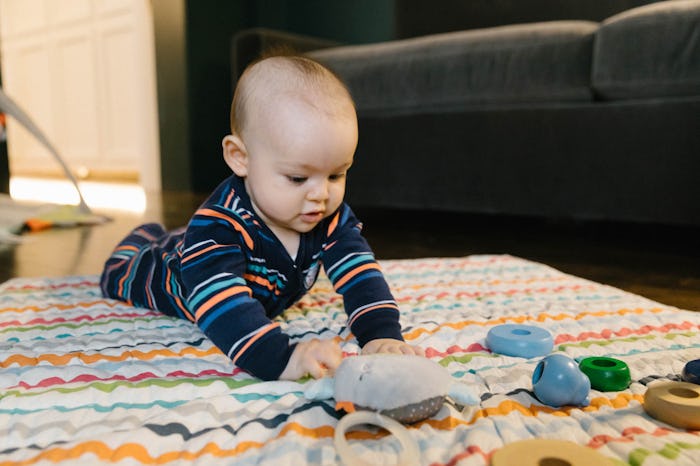When my daughter was a toddler she carried a ratty green blanket with her everywhere she went. She refused to sleep without it, eventually growing so attached to it that I bought a spare (just in case), only to discover that she could totally tell the difference. It didn't really bother me, though, especially since it seemed to help my little one sleep. In fact, I didn't think about how security blankets affect your baby later in life, but perhaps I should have. It turns out, a seemingly innocuous piece of fabric can make a huge impact. Babies are insanely fascinating, you guys.
According to the American Academy of Pediatrics' (AAP) website Healthychildren.org, a security blanket can be an important source of emotional support for your child. Parents might find that a security blanket can help their baby and/or toddler sleep, comfort them when they are upset, and reassure them when they are separated from a parent or in a new place. According to the same website, "these special comforts are called transitional objects, because they help children make the emotional transition from dependence to independence." In other words, when your child is going through so much developmental and potentially external change, a go-to item they can rely on has the capacity to give them the reassurance they need.
If you start to worry that your child will become too attached to their blanket or teddy, you can rest easy. Research from the American Psychological Association shows that children who have security blankets, or other transitional objects, are better able to cope with stressful situations like separation from their mothers at child care and medical exams if they bring their lovey along. And, according to Healthychildren.org, your child's attachment to their security blanket is likely to fade in time and as they find other ways to cope with stress.
Babycenter.com notes that there are a few cases where continued reliance on a blanket might warrant a conversation with your pediatrician. The site states, "if an older child or adolescent still clings to a lovey in stressful circumstances and isn't able to calm down without one, it could be a sign of a personality disorder." It's important to note that having a security blanket does not cause mental illness, though. Instead, it's just that the late attachment to one can be a warning sign.
Parents shouldn't be surprised or concerned if their child continues to re-visit their transitional object during times of change. As Dr. Barbara Howard, a developmental-behavioral pediatrician at Johns Hopkins, told The New York Times, up to 25 percent of female college freshman bring a security blanket or other lovey with them to college. A survey of 2,000 adults by Best Mattress Brand revealed that 16 percent of millennials still sleep with a comfort object as adults, a habit that might actually impact their relationships. According to the same survey, 29 percent of respondents said it would bother them if their partner still slept with a special blanket.
So even if your baby ends up taking their security blanket with them to college, you shouldn't worry. Relying on an object to see you through a big life change is not only normal, it can be healthy.
